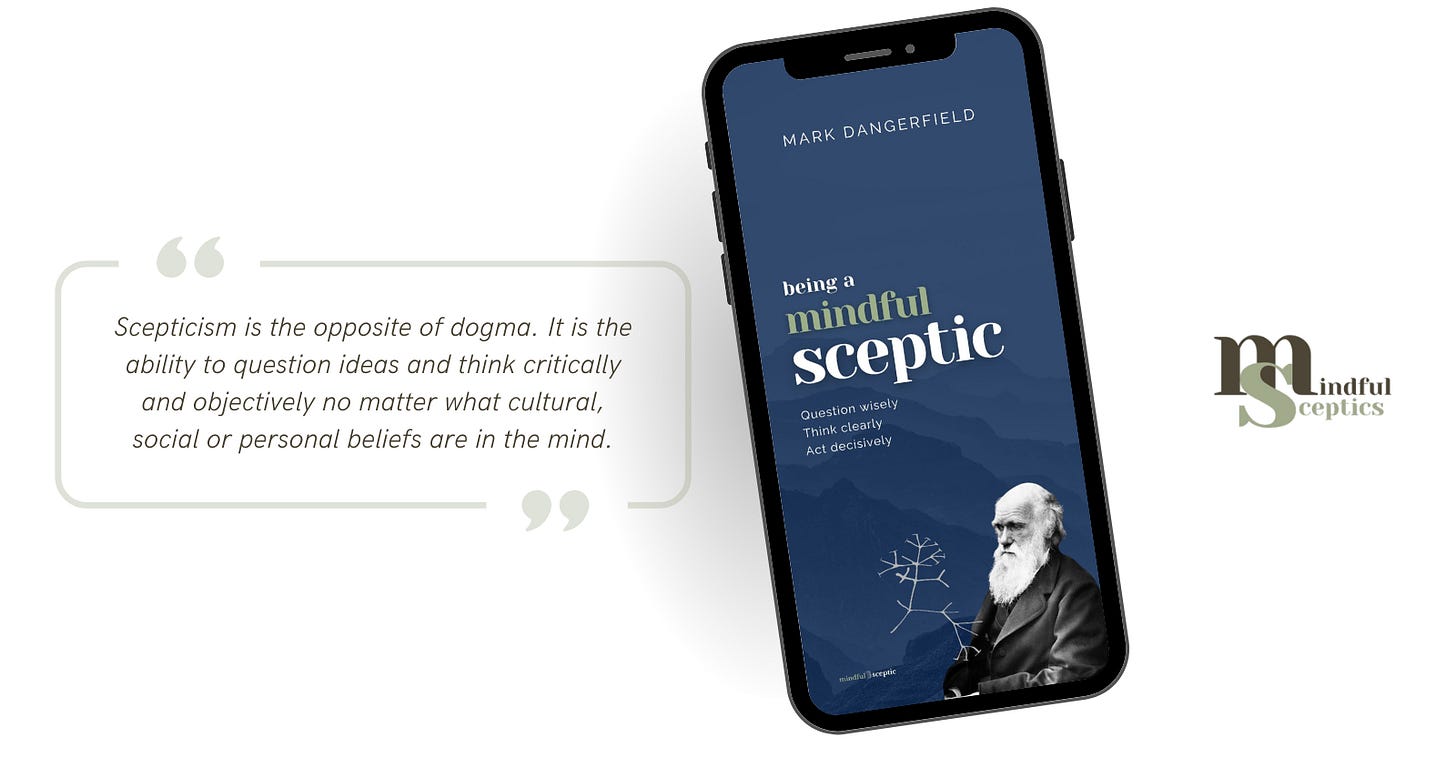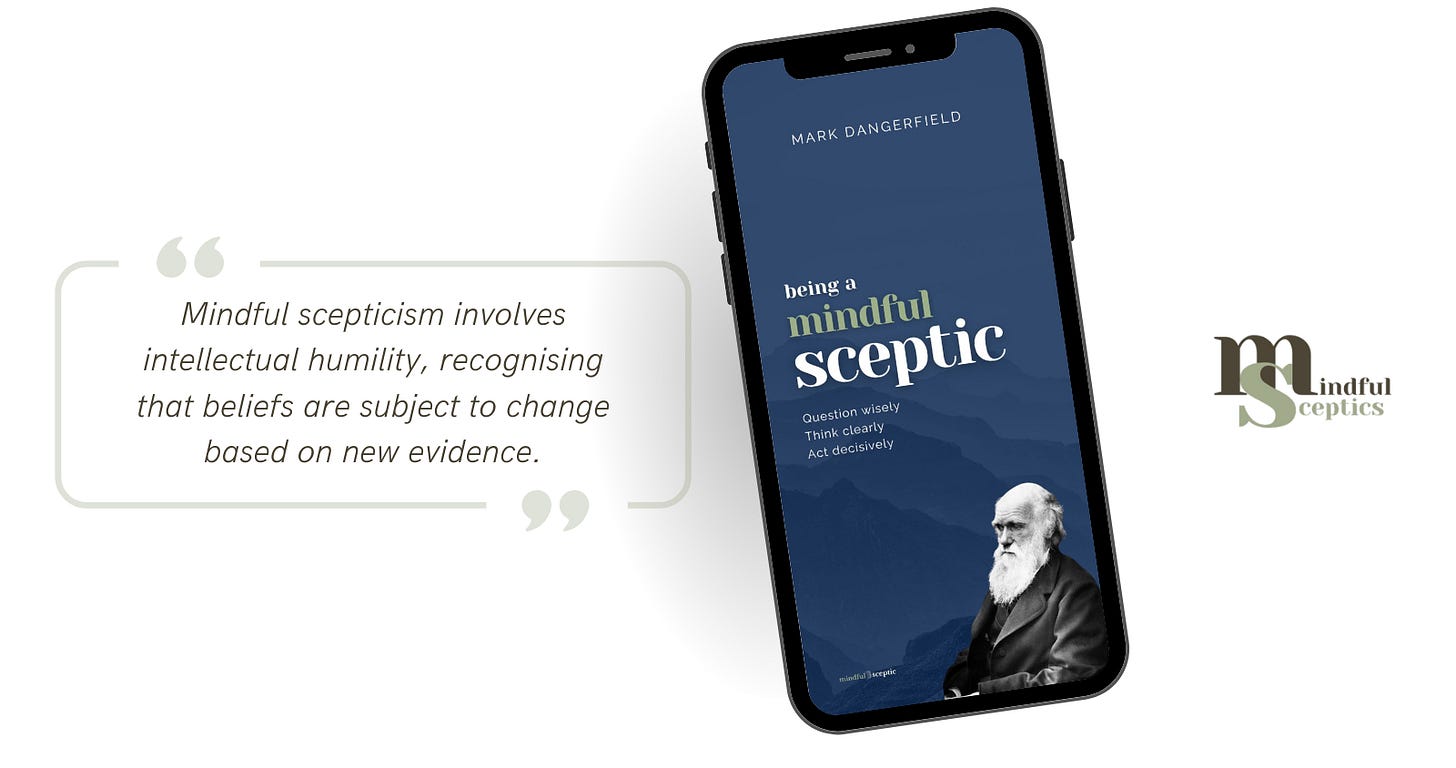Subversive Scepticism
True scepticism is defined by disciplined doubt, standing against dogmatism and convenient certainty
Core Idea
Scepticism in its true form is a discipline of seeking clarity, not a badge of cynicism. But in modern public discourse, the word “sceptic” now conjures agents of chaos. There are climate change deniers, post-truth contrarians, conspiracy celebrities with podcast followings, and pet dogs that know more about how the world works.
Scepticism began as a refusal to take any assertion at face value, a commitment to logic and evidence, and a perennial itch of curiosity over comfort. It’s the engine of every meaningful advance in science, civil rights, and even dissent.
But the brand has curdled. The term has drifted from its philosophical root of skeptikos, “the inquirer.” Sceptic is now an insult, not a compliment. “Sceptical” is a slur for anyone slowing the parade of certainty or faith.
What does this shift cost us? Everything, if we’re honest.
True scepticism is not denial. It is not “being against” out of habit, nor is it a performance of intellectual aloofness or populist scorn. Scepticism means sitting quietly with uncertainty until the facts are on the table. It means doubting yourself most of all while hunting for the best available evidence. The mindful sceptic seeks understanding, asks better questions, and refuses to mistake conviction for knowledge.
Counterpoint
Here lies the comforting myth… Doubt equals weakness, dissent equals obstinacy, and sceptics are closet denialists. “Sceptics” became the bête noire of every journalist and political hack needing a villain, an easy scapegoat for cultural gridlock or scientific stalling.
But this caricature is fraudulent.
Denial, by definition, is not scepticism but dogmatism and the mirror image of fanaticism. The denier already knows their answer; all evidence is ammunition, no matter what it says. The contrarian disagrees to be seen disagreeing.
This is not what I mean by sceptic. The mindful sceptic waits, tests, probes, and easily changes their mind. Discipline is their weapon, not reflex.
The subversive truth is that robust scepticism is an exercise in intellectual humility. It refuses to marry any cause without evidence. It lives in discomfort by refusing to accept comfortable stories or heroic certainty.
This stance is why scepticism is systemically necessary and why it has become an irritant to dominant institutions, ideological tribes, and self-appointed experts. A true sceptic is not a naysayer by trade but a threat to lazy thinking and narrative convenience.
It also happens to be civilisation’s last defence against error by consensus.
Thought Challenges
Take any headline or campaign that brands opponents as “sceptics” or “deniers.” Ask yourself, is the label used to dismiss uncomfortable questions? What actual evidence is being offered? Is the argument grounded in evidence, or in a story about team loyalty?
The next time a friend or expert delivers a confident assertion, ask them, “How do you know?” Demand clarity in definition, consistency in logic, and adequacy in evidence. Hold these up not as weapons, but as the tools of sanity. Journal what happens next.
Closing Reflection
The subversive task isn’t to rescue scepticism’s reputation, but to reclaim its essence. Bring back scepticism as disciplined doubt and the highest form of intellectual courage.
In a world of simple answers and pejorative labels, the mindful sceptic stands as a quiet radical. Not against for the sake of it, not belonging to any tribe, but for the ongoing, uncomfortable work of knowing and acting when certainty is a luxury few can afford.
Evidence Support
Kross, E., & Grossmann, I. (2012). Boosting wisdom: Distance from the self enhances wise reasoning, attitudes, and behavior. Journal of Experimental Psychology: General, 141(1), 43–48.
TL;DR… adopting a distanced perspective on personal conflicts enhances wise reasoning, which includes intellectual humility, recognition of uncertainty, and adoption of an integrative outlook, all essential traits for sceptical thinking.
Relevance to the insight… empirically supports the idea that humility and self-distancing—core aspects of mindful scepticism—foster more sophisticated, open, and courageous engagement with complex problems.
Whitcomb, D., Battaly, H., Baehr, J., & Howard-Snyder, D. (2017). Intellectual humility: Owning our limitations. Philosophy and Phenomenological Research, 94(3), 509–539.
TL;DR… analysis of intellectual humility as a crucial epistemic virtue, conceptualising it as a disposition to own one’s intellectual limitations and to be open to being corrected by evidence and by the views of others.
Relevance to the insight… a robust philosophical and psychological case for humility as a strength, not a weakness, aligning directly with the insight that humility in doubt is an intellectual asset rather than a liability.
Baehr, J. (2011). The Inquiring Mind: On Intellectual Virtues and Virtue Epistemology. Oxford: Oxford University Press.
TL;DR… provides an in-depth argument that scepticism—when paired with intellectual virtues like humility, open-mindedness, and perseverance—is foundational for the pursuit of knowledge and avoidance of dogma.
Relevance to the insight… a philosophical framework for why systematic doubt is a form of intellectual courage. It is precisely the willingness to question, to admit ignorance, and to seek better reasons that underpins the integrity and usefulness of sceptical inquiry.





